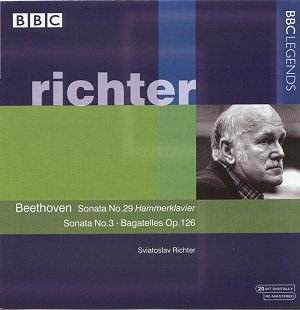BEETHOVEN
Sonata in B flat major, opus 106 'Hammerklavier'
Sonata in C major, opus 2 no. 3
Bagatelles, opus 126
 Sviatoslav Richter (piano)
Sviatoslav Richter (piano)
 BBC Legends BBCL 4052-2
(78
minutes)
BBC Legends BBCL 4052-2
(78
minutes)
Crotchet

The great Russian pianist Sviatoslav Richter gave this all-Beethoven recital
in London and at the Aldburgh in June 1975; it is the latter performance
from Blythburgh Church which is recorded here. A great occasion it was too.
I was there at the Royal Festival Hall and the occasion remains vividly in
my memory, now brought to life again by this splendidly atmospheric recording.
A critic wrote of the recital, 'Beethoven remains the ultimate challenge
for the pianist', and it is true that in the 'Hammerklavier' Sonata especially,
Richter communicates the feeling of rising to meet a supreme challenge.
The concentration of the playing in the slow movement is nothing less than
extraordinary, but it is the majestic grandeur with which the fugal finale
is delivered which is most special of all. Given the scale and sheer size
of this late Sonata, Richter wisely prefaced it with shorter pieces, though
they are not without substance themselves. The early Sonata in C, opus 2
no. 3, is a highly individual work, and Richter clearly believed its
forward-looking qualities would lead towards the world of the later masterpiece.
He was very fond of playing single-composer recitals, and perhaps this was
why. In between come the opus 126 Bagatelles, under-estimated by those who
do not really know them, these form Beethoven's final statement as a composer
of piano music, surprisingly wide ranging in their imageries and forward-looking
in their style.
Richter's qualities as an artist are readily communicated here. The performances
really do have something special to say about the music, and the ambient
recorded sound also succeeds in capturing the tone quality of the instrument.
Terry Barfoot
and Colin Clarke adds:
Characteristically searching Beethoven from Richter, caught live in Blythburgh
Church, Aldeburgh on June 11th, 1975. His
Op. 2 No. 3 has a monolithic quality that can appear relentless at times,
but what impresses most is his orchestral conception of this score. Listen
to his bass in the second movement: he positively recreates the sound of
organ pedals. He lets light into the Scherzo, however - the parts chase each
other around the keyboard in the most skittish of fashions.
The group of three Bagatelles forms a well-integrated grouping. Richter
is not afraid to bring out the manic quality of Op. 126 No. 4. He has all
the tenderness required for the Andante amabile e con moto of No.
6 (the tempo marking which takes up most of this piece: it is listed as merely
Presto on the back of the CD, although this only refers to the framing
six-bar gestures). Most people will probably buy this CD for the
Hammerklavier, however - and they will not be disappointed. The whole
performance has an imperial sense of breadth and grandeur borne of long
experience. Perhaps the most impressive factor is Richter's delineation of
textures (often under the most taxing of situations!): this is particularly
true of the almighty Fugue. Richter is fully aware that there is delicacy
amongst this most titanic of struggles, just as he realises the forward-looking
transition between third and fourth movements. Here he is not afraid to play
the toccata-like passages in as relentless a fashion as possible - almost
martellato - to play up the stark contrasts. Only in the Adagio
sostenuto did I slightly cheated: he just fails to achieve the rapt,
timeless quality at the heart of this movement.
Reviewer
Colin Clarke
Performance

Recording

